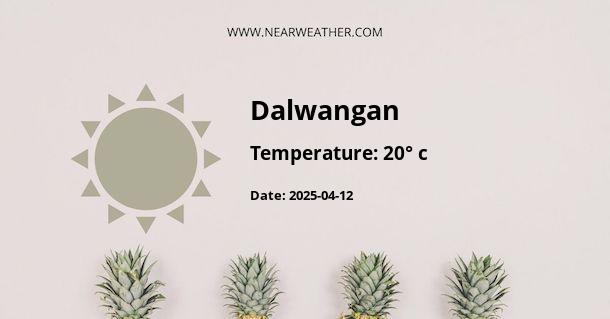The Climate and Weather in Dalwangan, Philippines
Dalwangan is a beautiful village located in the province of Bukidnon, Philippines. Situated in the southern part of the country, Dalwangan experiences a unique climate that is influenced by its geographical location and topography. In this article, we will explore the weather patterns and climate conditions in Dalwangan throughout the year.
Geographical Location and Topography
Dalwangan is nestled in the heart of the Bukidnon plateau, which is known for its rolling hills and vast agricultural lands. The village sits at an elevation of around 800 meters above sea level, providing it with a cooler climate compared to the lowland areas in the Philippines. Its location in the southern part of the country also puts it in close proximity to the equator, resulting in tropical weather conditions.
Annual Temperature in Dalwangan
Dalwangan experiences a relatively cooler climate compared to other parts of the Philippines due to its higher elevation. The annual average temperature in Dalwangan ranges from 18°C (64°F) to 26°C (79°F). The coolest months are usually from December to February, with temperatures dropping to around 15°C (59°F) during the nighttime. The hottest months, on the other hand, are from April to June when temperatures can reach up to 30°C (86°F).
The table below provides a summary of the average monthly temperatures in Dalwangan:
| Month | Average Temperature (°C) |
|---|---|
| January | 23 |
| February | 23 |
| March | 24 |
| April | 25 |
| May | 25 |
| June | 25 |
| July | 24 |
| August | 24 |
| September | 24 |
| October | 24 |
| November | 24 |
| December | 23 |
Rainfall Patterns in Dalwangan
Dalwangan experiences a distinct wet and dry season, typical of the tropical climate in the Philippines. The wet season usually starts in June and lasts until November, while the dry season spans from December to May. The village receives a significant amount of rainfall, with an annual average of approximately 2,000 millimeters (78 inches).
During the wet season, heavy rain showers and thunderstorms are common, especially in the afternoon and evening. The months of July and August usually have the highest rainfall, with some areas experiencing occasional flooding. On the other hand, the dry season is characterized by sunny and warm weather, making it the perfect time for outdoor activities and festivals.
The table below provides a summary of the average monthly rainfall in Dalwangan:
| Month | Average Rainfall (mm) |
|---|---|
| January | 50 |
| February | 40 |
| March | 50 |
| April | 80 |
| May | 150 |
| June | 200 |
| July | 250 |
| August | 250 |
| September | 200 |
| October | 180 |
| November | 120 |
| December | 70 |
Tropical Cyclones in Dalwangan
As with many areas in the Philippines, Dalwangan is also prone to tropical cyclones, commonly known as typhoons. These cyclones usually develop in the western Pacific Ocean and can bring strong winds, heavy rainfall, and potential flooding to the region.
The typhoon season in the Philippines typically runs from June to November, overlapping with the wet season in Dalwangan. It is important for residents and visitors to stay updated with the latest weather forecasts and follow safety precautions during typhoon events.
Best Time to Visit Dalwangan
The best time to visit Dalwangan depends on individual preferences and the type of activities one wishes to engage in. If you enjoy cooler weather and want to avoid heavy rainfall, the months of December to February are ideal. During this time, temperatures are more comfortable, and the chances of encountering rain showers are relatively lower.
On the other hand, if you enjoy lush green landscapes and vibrant festivals, visiting during the wet season can be a great experience. The abundance of rainfall during this time ensures the vibrant growth of plants and crops, creating a picturesque scenery. Additionally, the wet season brings various cultural events and festivals that showcase the rich traditions of the local community.
Conclusion
Dalwangan, Philippines, offers a unique climate and weather experience due to its higher elevation and proximity to the equator. The village enjoys cooler temperatures compared to lowland areas, with an annual average ranging from 18°C to 26°C. The wet and dry seasons provide distinct weather patterns, with heavy rain showers during the wet season and sunny days during the dry season. Visitors can plan their trips based on their preferences, either opting for cooler temperatures or experiencing the vibrant greenery and cultural festivities during the wet season.
A - Dalwangan's Latitude is 8.200560 & Longitude is 125.040558.
A - Weather in Dalwangan is 20° today.
A - Climate Conditions in Dalwangan shows broken clouds today.
A - Humidity in Dalwangan is 97% today.
A - Wind speed in Dalwangan is 3.67 km/h, flowing at 163° wind direction. today.
